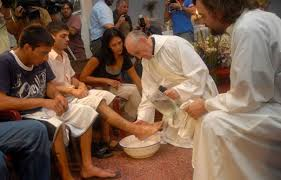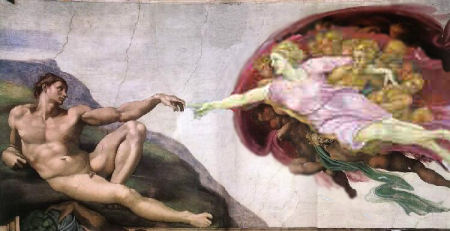Nativity of John the Baptist
“John heralded his coming by proclaiming a baptism of repentance to all the people of Israel.” Acts, 13:23
Best-selling author Malcolm Gladwell writes often of “tipping points” in human history – “dramatic moments … when everything can change all at once.”
Such is the story of John the Baptist.
In the Gospel of Luke, John is presented as being as important in history as the birth of the Messiah. John is seen and revered as the “greatest of all the prophets.” He is the ultimate teacher of morals who calls for actions that will lead to a total conversion experience. He is the one chosen by God to “prepare a people ready for the Lord.”
It is John the Baptist who first utters the famous Greek word “metanoia” – a word usually translated as “repent” in English. But it is a word that carries a meaning far more profound and rich:
Convert, change, develop a whole new mind set, begin walking an entirely different path, start seeing with a fresh set of eyes.
Or, to use the words that Luke places in the mouth of John:
“Prepare the Lord’s Way! Make straight his paths! Crooked ways will be made straight, rough ways smooth.”
Salvation, John informs us, comes only from God – not from wealth or extortion; not from acquisitiveness; not from greed or lust or theft or ignoring the needs of those who live in hunger and poverty.
“Metanoia!”
“Turn around. Be made into new people – a people ready for the Lord.”
People who embrace “the word of God.”
Metanoia!
It is the very same word that Jesus speaks.
But first Jesus must be introduced to us, and it is John who does so.
Introducing Jesus is the “tipping point” of John’s life, the “dramatic moment … when everything can change.”
It’s quite difficult for us to understand today just how popular and important John the Baptist was in the time of Jesus. People flocked to hear John and be baptized. His followers were so many, in fact, that Herod, who was appointed by the Romans to rule over Galilee, saw John as a very real threat to his power.
Herod’s fear was that John would cause a popular uprising so significant that it could challenge his authority, and the authority of Rome. The consequence, of course, was that, like Jesus later, John was killed by the Romans. Yet, many of John’s followers were still active into the second century.
Jesus was originally one of John’s followers. Most likely, Jesus’ original disciples were also followers of John.
Jesus, however, differed from John. Whereas John preached a God of vengeance and righteousness, a God who would “burn his chaff with unquenchable fire,” Jesus experienced the reality of God in an entirely different way:
The God that Jesus experienced through a profound life of prayer was One of gracious mercy, forgiveness, compassion and love – so much so, in fact, that the Gospel of John states directly: “God is Love.”
God is presented by the Gospels of Luke and John as being what I have come to call the “God of Prepositions”:
For us, With us, Among us, Between us, Within us.
Nevertheless, everything changed with John the Baptist.
He was the greatest of all the prophets from Israel’s past in that he was the one who ultimately recognized Jesus as the “stronger one than me who is coming. I am not fit to loose the straps of his sandals. He himself will baptize you with a Holy Spirit and with fire.”
And so it was:
“When all the people were being baptized (by John), and when Jesus had been baptized and was praying, that heaven was opened, and the Holy Spirit descended on him with the physical shape of a dove. Then there was a voice from heaven, ‘You are my beloved son. I am pleased with you.’”
John had done his part. He led the way. He opened the door. He introduced each of us to the Lord of life, the Savior, the Redeemer, the Son of God – the God of infinite Love.
He was the “tipping point” who even now asks us to follow Jesus, to mirror Jesus, to replicate Jesus, to love what Jesus loves, to do what Jesus does.
And, as he did so long ago, John is still at work urging us to change, to convert, to follow a whole new path, to see with different eyes, to walk in a whole new direction.
When we do that, we too can become “tipping points” for one another.
Ted Wolgamot, Psy.D.
11809194.1
6/8/18




